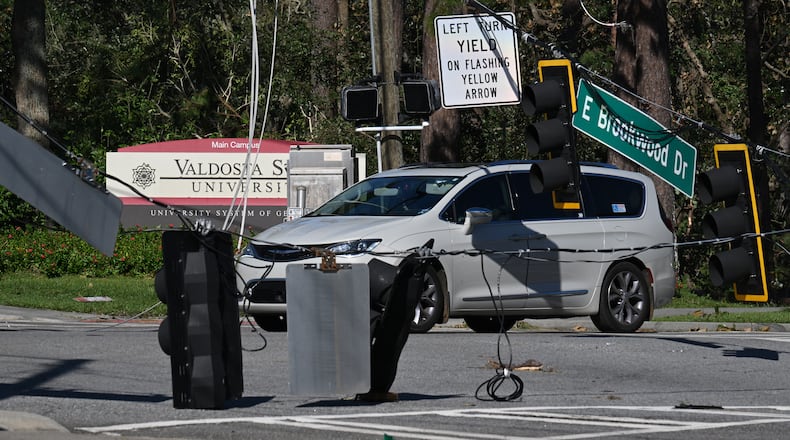These charities, nonprofits and religious groups are working to bring relief to people affected by Hurricane Helene.
Metro Atlanta-based Food Security for America, which serves low-income communities across Georgia, is raising money to provide food, water and other supplies to Augusta residents impacted by the storm. The organization is seeking donations at foodsecurityforamerica.org/donate to continue serving the community.
Send Relief, the Atlanta-based global nonprofit, is working with the Salvation Army to establish feeding sites in impacted areas including Valdosta, Augusta and Statesboro.
Josh Benton, Send Relief’s vice president for North America, said in addition to preparing meals, Send Relief teams and volunteers are helping with property clean up, using chain saws to clear downed trees and making immediate repairs to structures until insurance companies can come in and assess the damage. To donate to Send Relief’s hurricane relief fund, visit sendrelief.org/hurricane.
Atlanta-based nonprofit Caring For Others has activated its “All Hands Mission” in partnership with Convoy of Care to provide relief efforts and supplies to help residents in Augusta and Valdosta. Efforts could be expanded to other cities. The organization is accepting financial donations at its website, caring4others.org/hurricane-helene, as well as donations of cleaning tools and products. Product donations can be delivered to the Caring for Others headquarters at 3537 Browns Mill Road SE #2, before 3 p.m. Mondays through Fridays. The organization is in need of tarps, generators, bottled water, toilet paper, hygiene kits, first aid kits, feminine hygiene items, bleach and laundry detergent.
The American Red Cross is also helping people who have been impacted by Hurricane Helene. Go to redcross.org/shelter to find a shelter, or call 1-800-RED-CROSS (1-800-733-2767) if you need assistance. It’s staffed 24 hours a day.
The Salvation Army of Georgia will provide food, hydration and emotional and spiritual support to residents who need the help. Divisional Emergency Disaster Services Director Lanita Lloyd said Friday the charity was preparing to send employees and volunteers into the field. They will operate 14 mobile kitchens throughout the state, stocked with enough food to serve thousands of hot meals, snacks and drinks to survivors and relief workers. To make financial donations go to helpsalvationarmy.org or call 1-800-SAL-ARMY.
Atlanta-based CARE is also providing emergency relief in Georgia and other states hit by the storm. Those efforts include providing cash assistance to help families meet their essential needs such as food, medicine and hygiene supplies, as well as support to help rebuild and taking steps to protect the most at-risk populations, including women and girls. To learn more go to my.care.org.
The North Georgia Conference of the United Methodist Church‘s Early Response Teams are running chainsaws and helping with debris removal in Valdosta and Augusta. The United Methodist Church is also helping in other states including Kentucky, Florida, North and South Carolina and Tennessee. More is being scheduled in the weeks ahead to keep serving for as long as the communities need help recovering. The North Georgia conference receives financial donations through many United Methodist churches, or people can go to or ngumc.org/helene.
A coalition of partners, including the Ray C. Anderson Foundation, Cherry Street Energy, Footprint Project and the United Methodist Church, have deployed a solar microgrid trailer to the Valdosta area where it is powering lights and refrigeration at a church camp just north of Valdosta. That location will serve as base camp for trained United Methodist Committee on Relief Early Response Teams from Georgia.
AmeriCares, a health-focused nonprofit, has set up a webpage to receive donations at my.americares.org/give/623680#!/donation/checkout.
RomeGaCares, a local nonprofit out of the Floyd County Sheriff’s Office, is heading to east Georgia to clear debris, tarp buildings and bring pallets of water to nine counties in the area. Monetary donations can be mailed or dropped off at RomeGaCares, 2526 New Calhoun Highway, Rome, Georgia, 30161.
Episcopal Diocese of Atlanta has provided Camp Mikell in Toccoa as a refuge for people in need of temporary housing while waiting for utility services to be restored. The camp has power, hot water and access to well-stocked stores and gas stations. Camp Mikell is an Episcopal camp and conference center established in 1941. To arrange for temporary housing for up to two weeks at Camp Mikell, please contact camp Executive Director Jessica LeFiles at jessi@campmikell.com or Amanda at amanda@campmikell.com. People can also call 706-886-7515.
In a broader effort, Episcopal Relief & Development is working with faith-based and community-led organizations in Florida, Georgia, Tennessee, South Carolina and North Carolina to support people affected by the hurricane. Donate to the Hurricane Relief Fund to help provide emergency and long-term recovery support to people affected by Hurricane Helene and other recent disasters.
Here are specific efforts:
In partnership with the Diocese of Georgia, Episcopal Relief & Development is providing gift cards and distributing water, food, clothing and fuel to families in need in the cities of Valdosta, Vidalia, Louisville, Augusta and the surrounding areas.
In partnership with the Diocese of Florida, Episcopal Relief & Development is providing gift cards to impacted families in the Apalachee and Santa Fe regions of Florida
In partnership with the Diocese of Southwest Florida, Episcopal Relief & Development is providing gift cards and household items to families in places including St. Petersburg, Tampa, Bradenton, Sarasota and Venice.
Direct Relief, based in Santa Barbara, California, has committed an initial $250,000 in financial support to communities impacted by Helene. The organization opened access to its $74 million inventory of emergency medicines for needs arising from the storm, shipping needed items to free clinics, health centers and charitable pharmacies in Georgia, Florida, Tennessee, Virginia, North Carolina and South Carolina. To donate go to the organization’s website at directrelief.org.
Samaritan’s Purse, the Boone, North Carolina, international relief nonprofit, is sending volunteers into five locations in four states. Samaritan’s Purse often joins with local churches to provide aid and rebuild damaged homes. To donate go to samaritanspurse.org. Due to infrastructure damage in the area where the nonprofit is based, people may experience temporary delays reaching the organization by phone.
The Tallahassee-based Kearney Center is a 24-hour comprehensive emergency center for people experiencing or on-the-verge of homelessness in the Big Bend region. It also serves as an emergency shelter during disasters. The nonprofit is accepting donation to support its services through its website, kearneycenter.org.
The Food Bank of Central and Eastern North Carolina is providing emergency kits and ready-to-go meals for families impacted by Hurricane Helene. The nonprofit is connecting with first responders and food banks with additional nonperishable food, tarps and other supplies.
Due to widespread flood damage and infrastructure problems the North Carolina, food banks have launched a shared fund dedicated to disaster relief efforts in 25 affected counties and the Eastern Band of the Cherokee Nation. To donate, go to Feeding the Carolinas’ website at 4agc.com.
To get help go to foodbankcenc.org/helene.
Emergency food assistance stations are active in impacted North Carolina counties — providing meals, nonperishable food, water and basic necessities to local residents. Current locations include:
- Ashe County — Westwood Elementary School, Mountain View Elementary School
- Buncombe County — UNC-Asheville, Asheville Buncombe Tech Ferguson, WNC Ag. Center, Asheville-Buncombe Tech Conference Center, Biltmore Baptist Church, The Greens at Weaverville, Fletcher Nursing and Rehabilitation.
- Catawba County — Catawba Valley Community College Tarlton Complex
- Henderson County — First Baptist Church Hendersonville, Greens at Hendersonville
- Madison County — Madison County Cooperative Extension Service
- McDowell County — Nebo Crossing Church, Grace Community Church
- Mitchell County — First Baptist Spruce Pine
- Polk County — Polk County High School
- Rowan County — Rowan-Cabarrus YMCA
- Watauga County — Cove Creek Volunteer Fire Department, Zionville VFD, Foscoe Christian Church, Watauga EOC, Holmes Convocation Center, Meat Camp Road, Town of Boone PD, First Baptist Boone.
The North Carolina Community Foundation is encouraging donations to groups that are working to address immediate health, humanitarian and safety needs in western North Carolina in the wake of the devastation left by Hurricane Helene, including the North Carolina Disaster Relief Fund at nccommunityfoundation.org. To donate by mail, please send contributions to: North Carolina Disaster Relief Fund, 20312 Mail Service Center, Raleigh, North Carolina, 27699.
Humane Society of the United States is helping communities and animals affected by Hurricane Helene by transporting cats and dogs to safety, helping devastated animal shelters and providing food, resources and veterinary care. They are working with local emergency management and animal services agencies in North Carolina, South Carolina and Georgia. Animal rescue teams remain on the ground in Florida and Tennessee to help animals in areas hit hard by the storm. For information or to donate, go to humanesociety.org.
The Arthur M. Blank Family Foundation had made a $2 million grant to World Central Kitchen, which provides meals and water following climate, community and humanitarian crises. The funds are being used for immediate relief in Georgia, with the potential to serve additional impacted communities. Currently, WCK teams are in Georgia, Florida, North Carolina and Tennessee. To support WCK go to the nonprofit’s website at wck.org.
The Illinois-based Zakat Foundation of America is distributing 400 emergency relief packets containing food, water and personal care kits to people affected by Hurricane Milton. . The foundation has established a base at the Heathrow Muslim Community Center in Florida.
If you need assistance
Visit the Georgia Emergency Management and Homeland Security Agency website at gema.georgia.gov/hurricane-helene for information on shelters and assistance in storm-damaged areas. The Georgia Region of the American Red Cross is also compiling information on requesting assistance and shelter.
Keep Reading
The Latest
Featured




